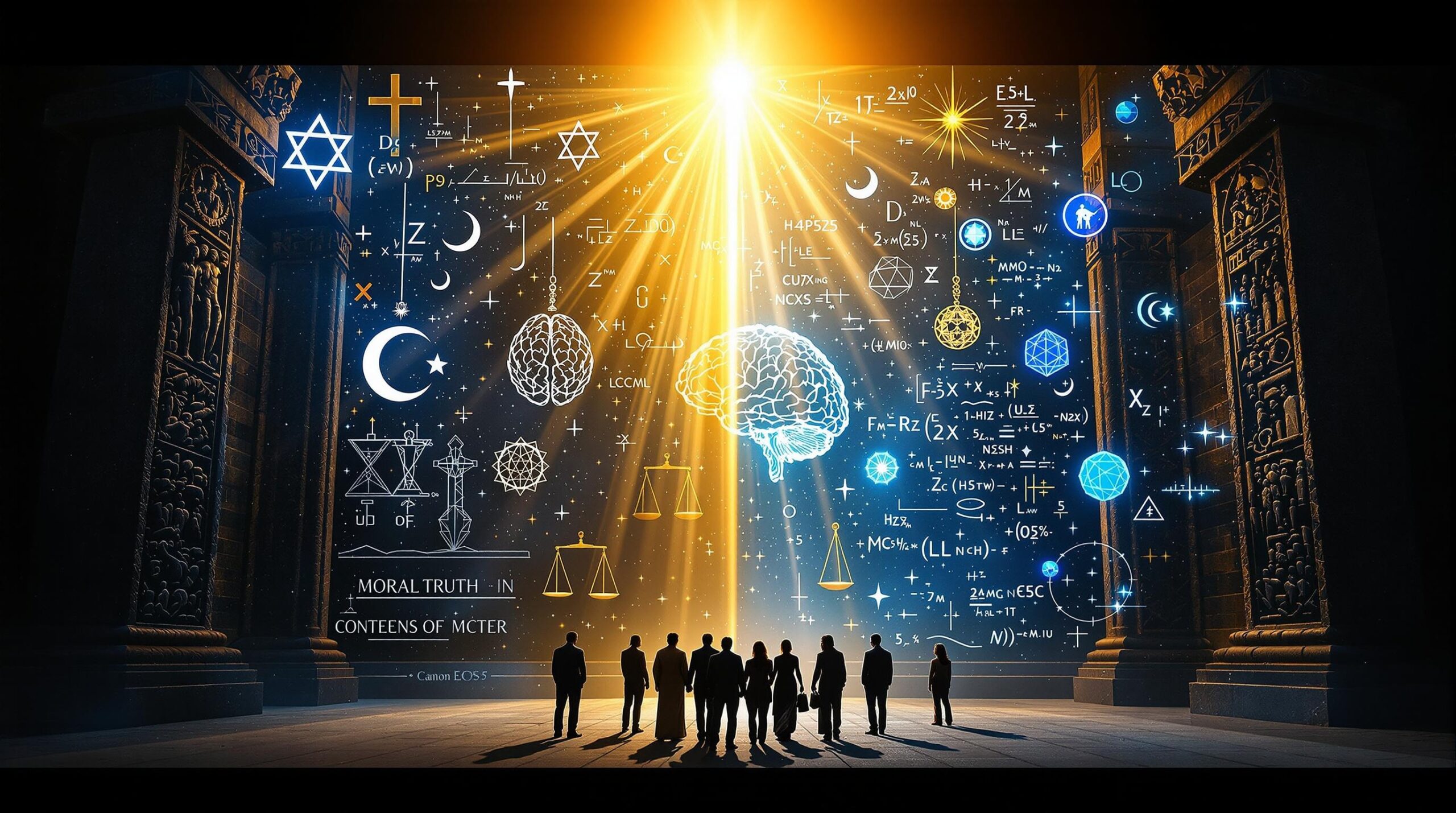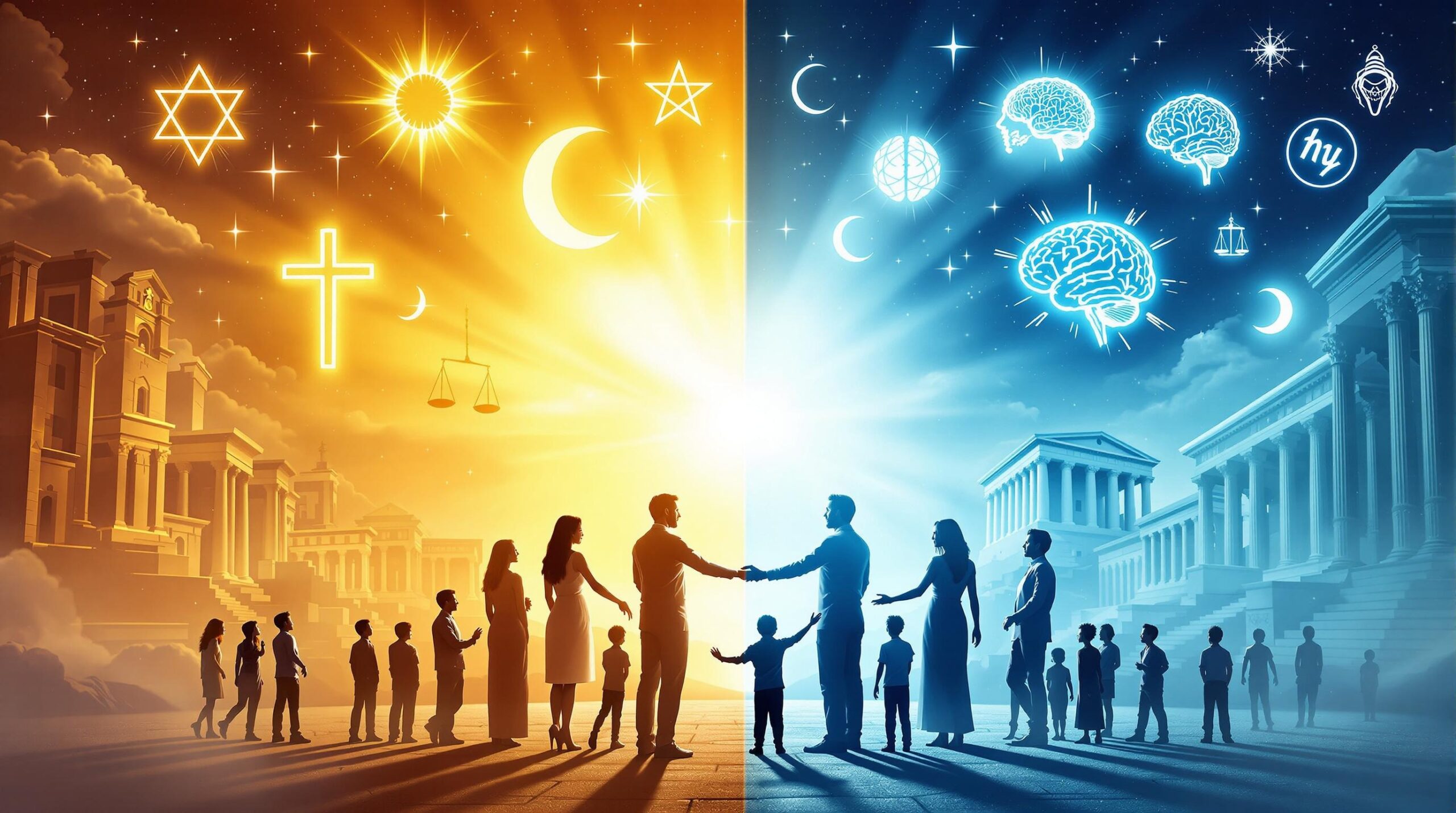When your friend claims they need religion to be moral, or when someone argues that atheists lack ethical foundations, you’re witnessing one of philosophy’s most enduring debates. According to Stanford Encyclopedia of Philosophy, over 60% of contemporary moral philosophers believe ethical systems can function independently of religious foundations. This fundamental question “Can morality exist without God” has sparked centuries of philosophical debate, examining whether divine command theory is necessary for moral behavior or if secular ethical frameworks can provide sufficient guidance for human conduct.
Key Takeaways
- Secular ethical frameworks like utilitarianism and virtue ethics demonstrate that moral reasoning can exist independently of religious doctrine
- Religious moral systems offer absolute foundations through divine command theory, providing clear moral certainties
- Scientific research shows that empathy and moral intuition develop naturally in humans regardless of religious upbringing
- Both secular and religious approaches share common values like compassion, justice, and human dignity
- The effectiveness of moral systems depends more on practical application than their theoretical foundations
The Science Behind Natural Moral Intuition

Recent neuroscientific research reveals compelling evidence about human moral development. Studies published in Nature show that infants as young as six months display moral preferences, favoring helpful characters over harmful ones.
This research suggests moral intuition emerges naturally through evolutionary processes. Dr. Marc Hauser’s studies at Harvard demonstrated that people across cultures make remarkably similar moral judgments, even when their reasoning differs significantly.
The data challenges assumptions about moral education requiring religious instruction. Children raised in secular households show similar levels of empathy and moral reasoning compared to those from religious backgrounds, according to research in Current Biology.
Secular Philosophical Frameworks That Work
Secular philosophers have developed sophisticated moral systems that operate independently of divine authority. These frameworks address fundamental ethical questions through reason-based approaches.
Utilitarianism, developed by Jeremy Bentham and John Stuart Mill, focuses on maximizing overall happiness and minimizing suffering. This system evaluates actions based on their consequences rather than divine commands.
Virtue ethics, tracing back to Aristotle, emphasizes character development and human flourishing. It identifies virtues like courage, honesty, and compassion as intrinsically valuable traits that lead to meaningful lives.
Kant’s deontological ethics provides absolute moral rules through reason alone. His categorical imperative offers universal principles without requiring divine authority, suggesting moral duties arise from rational thinking.
Practical Applications of Secular Ethics
Modern ethical frameworks demonstrate real-world effectiveness. Sweden and Denmark, among the world’s least religious nations, consistently rank highest in global happiness and social welfare indicators.
Secular bioethics committees guide life-and-death medical decisions in hospitals worldwide. These panels use principled reasoning to address complex situations involving end-of-life care, organ transplantation, and experimental treatments.
Environmental ethics has emerged as a purely secular discipline. Scientists and philosophers develop principles for sustainable living based on scientific understanding rather than religious doctrine.
Religious Moral Foundations and Divine Command Theory
Religious traditions offer different answers to whether morality requires divine authority. Divine command theory argues that moral obligations derive directly from God’s will, making religious belief essential for true morality.
Christianity emphasizes love, forgiveness, and service to others as fundamental moral principles. The Ten Commandments provide clear behavioral guidelines that have influenced legal systems for millennia.
Islam’s concept of *taqwa* (God-consciousness) connects moral behavior directly to divine awareness. Islamic ethics emphasize justice, compassion, and social responsibility as expressions of faith.
Judaism contributes the concept of *tikkun olam* (repairing the world), which frames moral action as partnership with the divine in perfecting creation.
Strengths of Religious Moral Systems
Religious frameworks provide several advantages in moral reasoning. They offer absolute foundations that don’t shift with cultural trends or personal preferences. The authority of divine command creates powerful motivation for moral behavior.
Religious communities provide social support for ethical living. Congregations offer accountability, encouragement, and practical assistance in maintaining moral standards.
Sacred texts and traditions preserve moral wisdom across generations. These repositories contain centuries of reflection on complex moral dilemmas and their resolution.
Comparing Religious and Secular Approaches
When examining whether morality requires divine foundations, both approaches reveal significant strengths and limitations. The comparison highlights fundamental differences in methodology and foundation.
Religious systems excel at providing motivation and community support. Believers often report stronger commitment to moral principles when connected to divine purpose. The promise of eternal consequences adds weight to moral decisions.
Secular systems demonstrate greater flexibility in adapting to new circumstances. They can incorporate scientific discoveries and cultural evolution without challenging fundamental theological commitments.
Both approaches struggle with consistency in application. Religious believers sometimes ignore inconvenient moral teachings, while secular thinkers may rationalize self-serving behaviors through philosophical reasoning.
Convergence on Core Values
Despite different foundations, religious and secular moral systems converge on many fundamental principles. Both emphasize human dignity, compassion for suffering, and the importance of justice.
The Golden Rule appears in various forms across religious traditions and secular philosophy. This principle suggests universal moral intuitions that transcend specific belief systems.
Research by psychologist Jonathan Haidt identifies six moral foundations present across cultures: care, fairness, liberty, authority, loyalty, and sanctity. These categories help explain why different moral systems reach similar conclusions through different reasoning.
Cultural and Historical Context in Moral Development
The relationship between religion and morality has evolved significantly throughout history. Ancient Greek philosophers developed sophisticated ethical systems without monotheistic foundations, suggesting that complex moral reasoning predates divine command traditions.
The Enlightenment period saw systematic attempts to ground morality in reason rather than revelation. Philosophers like Kant and Hume argued that human rationality could discover moral truths independently of religious authority.
Modern secular societies have developed legal and ethical frameworks that function effectively without explicit religious foundations. Countries like Japan demonstrate high levels of social cooperation and moral behavior despite limited Christian influence.
Contemporary globalization has created new challenges requiring moral frameworks that can bridge religious and cultural differences. International human rights law represents an attempt to establish universal moral principles based on shared humanity rather than specific theological commitments.
Psychological and Social Dimensions
The question of whether morality requires divine foundations extends beyond philosophical theory into psychological and social realities. Human moral behavior appears influenced by multiple factors beyond belief systems.
Social psychology research reveals that moral behavior correlates more strongly with situational factors than with stated beliefs. The famous Stanford Prison Experiment and Milgram’s obedience studies show how circumstances can override both religious and secular moral commitments.
Empathy emerges as a crucial component of moral behavior regardless of its theoretical foundation. Neuroscientist Antonio Damasio’s research demonstrates that emotional responses, particularly empathy, play essential roles in moral decision-making.
Community support significantly influences moral behavior in both religious and secular contexts. Social movements for civil rights, environmental protection, and human welfare have mobilized both believers and non-believers around shared moral purposes.
Addressing Common Ethical Dilemmas
Both religious and secular approaches offer tools for addressing complex ethical dilemmas. Consider the challenge of end-of-life medical care, where families must balance respect for life, individual autonomy, and compassionate care.
Religious perspectives might emphasize the sanctity of life as a divine gift, leading to prolonged life support in terminal cases. Secular bioethics might prioritize quality of life and personal autonomy, potentially supporting earlier withdrawal of treatment.
Many people combine insights from both approaches. A religious person might value divine authority while also considering utilitarian consequences. A secular thinker might appreciate religious wisdom while maintaining rational independence.
Modern Implications and Global Challenges
Contemporary challenges highlight the practical importance of this philosophical question. Climate change, artificial intelligence, genetic engineering, and global inequality require moral frameworks that can unite diverse populations.
Technology companies address ethical AI development using primarily secular frameworks focused on harm reduction and fairness. These efforts suggest that complex moral reasoning can proceed without religious foundations.
International cooperation on global challenges often requires secular language that respects religious diversity while identifying shared values. The United Nations Declaration of Human Rights exemplifies this approach.
The rise of “spiritual but not religious” demographics creates new categories beyond simple religious versus secular divisions. Many people seek moral guidance from multiple sources, creating hybrid approaches to ethical living.
Building Bridges Between Perspectives
The most productive approaches to moral reasoning often integrate insights from both religious and secular traditions. This synthesis acknowledges that morality can exist without divine authority while recognizing the valuable contributions of religious wisdom.
Interfaith dialogue demonstrates how different religious traditions can find common ground on moral issues. Environmental protection, poverty reduction, and human rights advocacy unite believers across theological differences.
Academic bioethics committees typically include both religious and secular members, creating productive collaboration around life-and-death decisions. This practical cooperation suggests that the theoretical question may be less important than effective moral reasoning.
Conclusion
The evidence strongly suggests that morality can exist without divine foundations, though religious traditions offer valuable insights and motivational frameworks. Secular philosophical systems, evolutionary psychology, and cross-cultural research all demonstrate that humans can develop sophisticated moral reasoning independently of divine command.
However, this conclusion doesn’t diminish the significance of religious moral traditions. Many people find meaning, motivation, and community through faith-based ethical systems. The question isn’t whether one approach is superior, but how different moral frameworks can contribute to human flourishing.
The most pressing moral challenges facing humanity—climate change, technological ethics, global inequality—require cooperation across religious and secular divides. Success depends less on resolving theoretical debates about moral foundations than on building practical alliances around shared values.
Moving forward, the most productive approach may involve what philosopher John Rawls called “overlapping consensus”—identifying shared moral commitments that emerge from different foundational beliefs. This strategy allows religious and secular thinkers to collaborate on urgent moral challenges while maintaining their distinct theoretical commitments.
Frequently Asked Questions
Do atheists have the same moral intuitions as religious people?
Research shows atheists and religious people share most fundamental moral intuitions about harm, fairness, and care. Differences appear mainly in areas involving authority, tradition, and sanctity.
Can secular ethics provide absolute moral rules?
Secular philosophers like Kant argue that reason can discover absolute moral principles. However, many secular approaches embrace moral pluralism rather than seeking single absolute foundations.
Why do some people believe morality requires divine authority?
Divine command theory provides clear authority, absolute foundations, and powerful motivation for moral behavior. Many find comfort in objective moral standards grounded in divine will.
How do secular and religious people resolve moral disagreements?
Both groups use similar reasoning processes involving consequences, principles, and values. Productive dialogue focuses on shared concerns rather than foundational differences about divine existence.
Sources:
Wikipedia Foundation – Secular Humanism: Philosophy, Ethics, and Modern Applications
PMC Medical Ethics – Religious Morality and Secular Humanism in Western Civilization: Historical Perspective
ResearchGate – Ethics, Secular and Religious: An Evolved-Cognitive Analysis
Internet Encyclopedia of Philosophy – Evolutionary Ethics: Biology and Moral Philosophy
Wikipedia Foundation – Secular Morality: Historical Development and Contemporary Applications
Wikipedia Foundation – Secular Ethics: Principles, Methods, and Contemporary Debates
Psychology Today – What Is Secular Humanism?
Alert Hub Academic – Understanding Secular Humanism: Core Principles Explained


